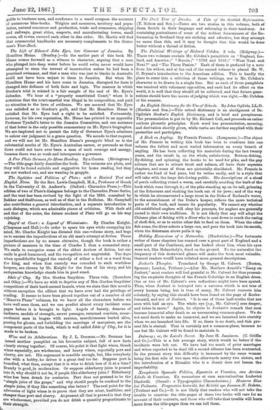Joubert's Thoughts. Translated by George H. Calvert. (Boston, Spencer; London,
Trlibner.)—After Mr. Matthew Arnold's "Essay on Joubert," most readers will feel grateful to Mr. Calvert for thus present- ing the exquisite thoughts of the French Coleridge in an English dress. One or two of Mr. Calvert's own reflections might have been spared. Thus, when Joubert is betrayed into a sarcasm which is not true of every human being, but is true of many, Mr. Calvert corrects him solemnly, by saying this should have been found on the page of Roche- foncauld, and not of Joubert. "It is one of those half-truths that are- seen with half an eye. The whole eye (e.g., Mr. Calvert] sees deeper, and takes in more." Again, he objects to Joubert's remark that men become immortal after death as an unreasoning common-place. We do- not need death to make us immortal, and we are launched into etoralty when we are launched into life. If so, there is no death, and this pre- sent life is eternal. That is certainly not a common-place, because no- one but Mr. Calvert will be found to maintain it.






























 Previous page
Previous page